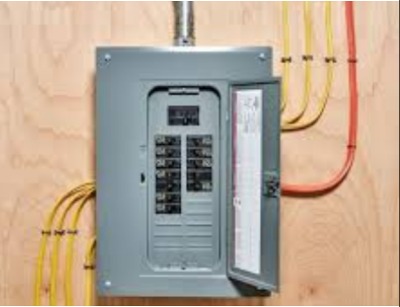
Welcome to mariaelectricals.com. In this article, you will learn how to wire a breaker box.
Wiring a breaker panel is the work of a professional electrician, and never a DIY project. This is because the board serves as a hub where incoming power is distributed to the branch circuits in your house.
Such work requires a licensed electrician who understands wiring codes, breaker sizing, and electrical safety.
Electrical panels come with different amps of breakers to suit different loads in your home.
They are usually installed on the wall near the point the main feeder wire enters the house.
Tools and materials required to install the main breaker panel
Tools
- Screwdrivers
- Wire stripper
- Voltage tester
- Fishing tape
- Hammer
- Level
- Chisel
- Tape measure
Materials
- Main Circuit breaker panel
- Electrical tape
- Circuit breakers
Steps to wiring the circuit breaker panel.
To wire a distribution board, you first locate and mark the place where you will mount the service panel. Once you are through with that, you can continue with the next step.
Remove the knockouts on the panel box
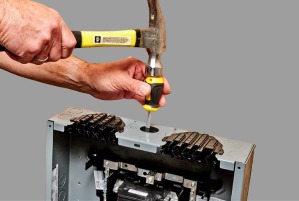
Using your hammer and chisel, remove the knockouts on the breaker panel so there will be space for wire passage. The knockouts are those round metal discs at the back, sides and top of the panel.
After removing the knockouts, install the cable connectors into the panel and secure it, using the luck nut.
Mount the main panel on the wall
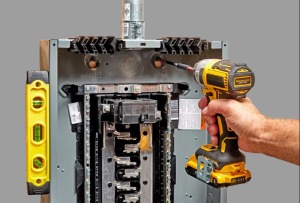
Position the panel box in the marked area and use your level to make sure it is plum. Anchor it to the wall using a drilling machine and screw.
Make sure that the panel is firm and tight on the wall.
Feed in the three main service wires
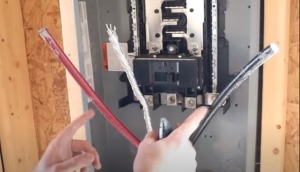
Feed the three service wires into the main breaker box. The service wires are usually three, two hot (red and black wire), and a white neutral wire.
Pull in enough wire into the panel that will serve for the connection and hold it with a clamp.
Connect the service wires
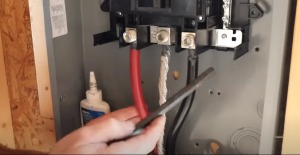
Strip the end of the wires with a wire stripper and connect them to the lugs on the main switch
Connect the white or neutral wire to the neutral bus bar, and the two hot wires to the two hot bus bars on the main circuit breaker.
The main circuit breaker is usually a large 240 V breaker that controls all the power that goes into your home.
Connect the main ground wire
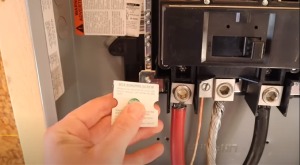
Run a 6 gauge bare copper wire from the earth rod to the main service panel. Connect the earth wire to the ground bus bar and tighten it.
Feed wires into the breaker box
Feed in wires into the breaker box and label them. These wires will be used to connect individual circuit breakers, such as 20-amp circuits, 15 amp breakers and others.
Strip the end of these wires and begin the installation.
Install a 30 amp double pole breaker for your 220 V appliances
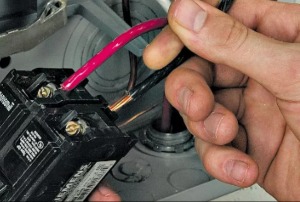
A 30 amp breaker requires a 10-2 wire plus ground for maximum performance. Connect the two hot wires to the hot terminal screws, and the ground wire to the ground bus.
Use the same process to install other circuit breakers.
Complete the installation
Once you are done with the wiring, cover the circuit breaker panel and tighten it with screws.
Turn on the main switch and the individual circuit breakers to make sure they are working fine.
Label the panel to show the function of each circuit. This will enable the homeowner or a future electrician to identify and shut off individual circuits when necessary.
Conclusion
Circuit breaker wiring is never an easy task, it is a work that requires a professional electrician. On no account should you try wiring it if you are not experienced.
Always wear your protective equipment such as safety gloves, goggles, and boots. Always use the normal gauge wire and don’t overload the circuit breaker.
Related articles
- 3 Way Switch Wiring / How to Wire 3-Way switches
- How to Wire a 220V Plug with 3 Wires
- Doorbell Wiring Diagrams: How to install a Transformer, Chime, and Push Button
- How to Wire a 220v Plug with 4 Wires
- What Wire Size Do I Need for my 60 Amp Breaker?
- How to Install a GFCI Outlet in your Bathroom and Kitchen
- house wiring
- Ungrounded Outlets Explained! Dangers and How to Fix the Issue.